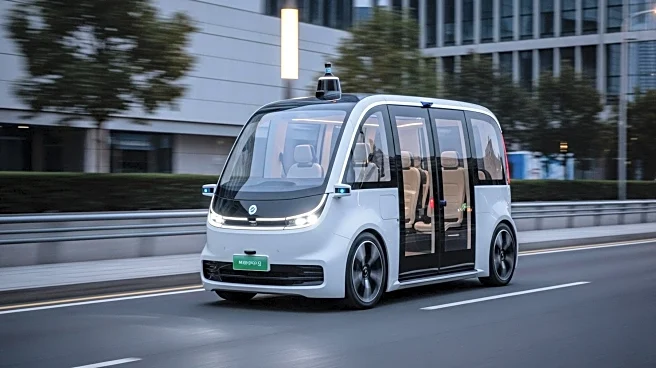What's Happening?
Singapore has launched its first self-driving shuttles in Punggol, marking a significant milestone in autonomous vehicle deployment. The shuttles, featuring five- and eight-seater vehicles, will operate three routes to improve connectivity in areas less accessible by public transport. Initially, the shuttles will map routes and familiarize themselves with road conditions without passengers. By early 2026, the community will be invited to try the service for free before commercial operations begin. The initiative involves partnerships with companies like Pony.ai and Grab, aiming to integrate autonomous vehicles into the public transport network while ensuring safety with onboard operators.
Why It's Important?
The introduction of self-driving shuttles in Singapore represents a major advancement in transportation technology, potentially transforming public transit systems. Autonomous vehicles offer the promise of safer, more efficient, and environmentally friendly transportation options. This initiative could lead to reduced traffic congestion and improved accessibility, particularly in areas underserved by traditional public transport. It also highlights Singapore's commitment to innovation and its role as a leader in smart city development, setting a benchmark for other cities considering similar technologies.
What's Next?
As the self-driving shuttle service progresses towards commercial operation, stakeholders such as transport authorities, technology firms, and the public will closely observe its impact on urban mobility and safety. The success of this initiative could influence future transportation policies and encourage further investment in autonomous vehicle technology. Additionally, ongoing collaborations with companies like Pony.ai and Grab may lead to expanded routes and services, enhancing the overall public transport network.
Beyond the Headlines
The deployment of self-driving shuttles in Singapore raises important considerations about the future of transportation and the integration of autonomous technology into daily life. It prompts discussions on job displacement, safety, and the ethical implications of relying on automated systems. The initiative also reflects broader trends in urban planning and the pursuit of sustainable, technology-driven solutions to address transportation challenges.









